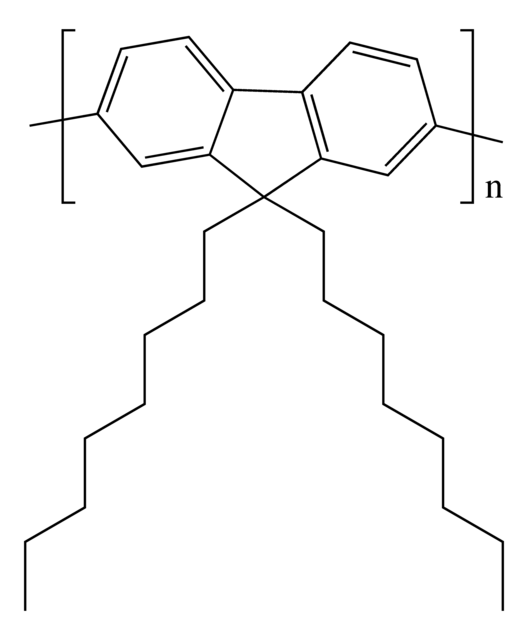536512
Poly[2-methoxy-5-(2-ethylhexyloxy)-1,4-phenylenevinylene]
Sinónimos:
MEH-PPV
About This Item
Productos recomendados
descripción
Band gap: 2.3 eV
fluorescencia
λex 493 nm; λem 554 nm in toluene
Energía orbital
HOMO -5.3 eV
LUMO -3 eV
rendimiento de la unidad OLED
ITO/PEDOT:PSS/MEH-PPV/Al
ITO/PEDOT:PSS/MEH-PPV/PBO/Al
ITO/PEDOT:PSS/MEH-PPV/PBZT/Al
rendimiento de la unidad OPV
ITO/MEH-PPV/BBL/Al
ITO/MEH-PPV:PC61BM(1:4)/Ca
Mw/Mn
<4
temp. de almacenamiento
2-8°C
¿Está buscando productos similares? Visita Guía de comparación de productos
Descripción general
Aplicación
Filter before application.
- field effect transistors(FET)
- photovoltaic cells
- light emitting diodes(LED)
- sensors for biomedical applications
- photodiodes
Código de clase de almacenamiento
13 - Non Combustible Solids
Clase de riesgo para el agua (WGK)
WGK 3
Punto de inflamabilidad (°F)
Not applicable
Punto de inflamabilidad (°C)
Not applicable
Equipo de protección personal
Eyeshields, Gloves, type N95 (US)
Elija entre una de las versiones más recientes:
¿Ya tiene este producto?
Encuentre la documentación para los productos que ha comprado recientemente en la Biblioteca de documentos.
Artículos
PCBM-based n-type semiconductors - Find p- and n-type organic semiconductors available from Sigma-Aldrich with PCBM library & properties.
The development of high-performance conjugated organic molecules and polymers has received widespread attention in industrial and academic research.
Light-Emitting Polymers
Professor Chen (Nankai University, China) and his team explain the strategies behind their recent record-breaking organic solar cells, reaching a power conversion efficiency of 17.3%.
Nuestro equipo de científicos tiene experiencia en todas las áreas de investigación: Ciencias de la vida, Ciencia de los materiales, Síntesis química, Cromatografía, Analítica y muchas otras.
Póngase en contacto con el Servicio técnico